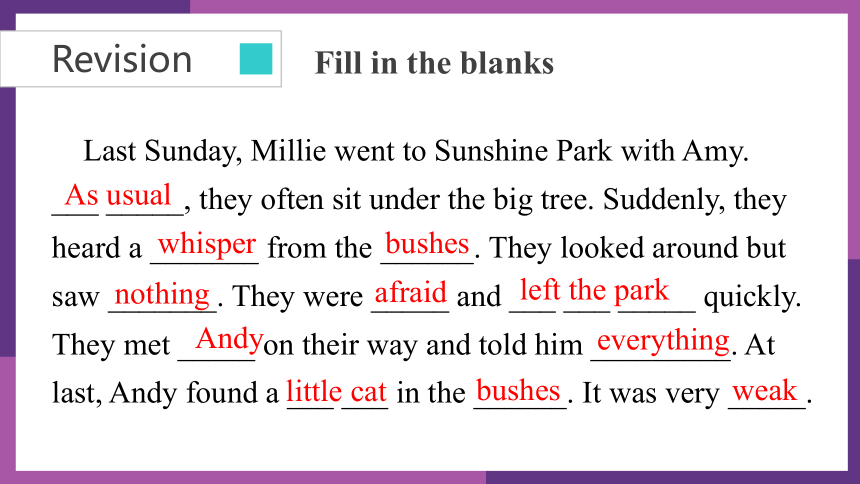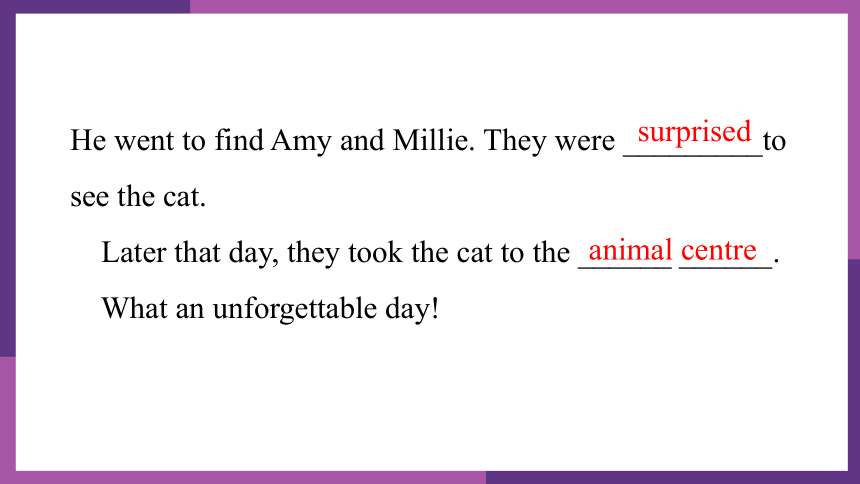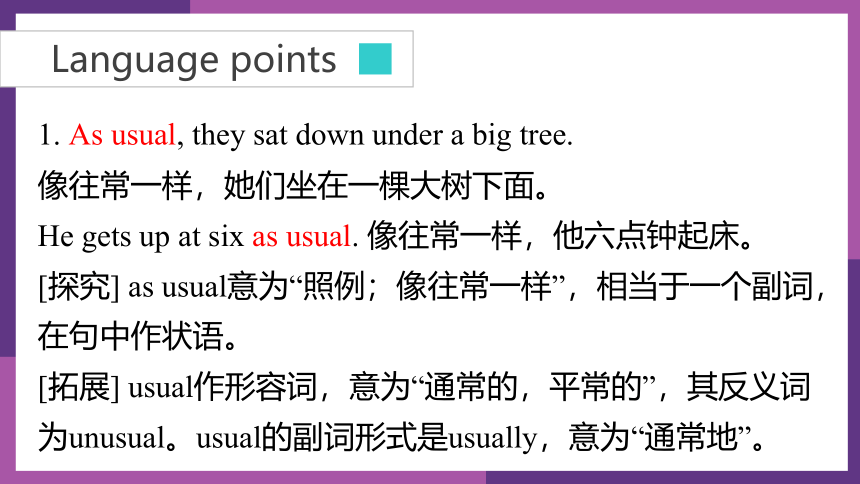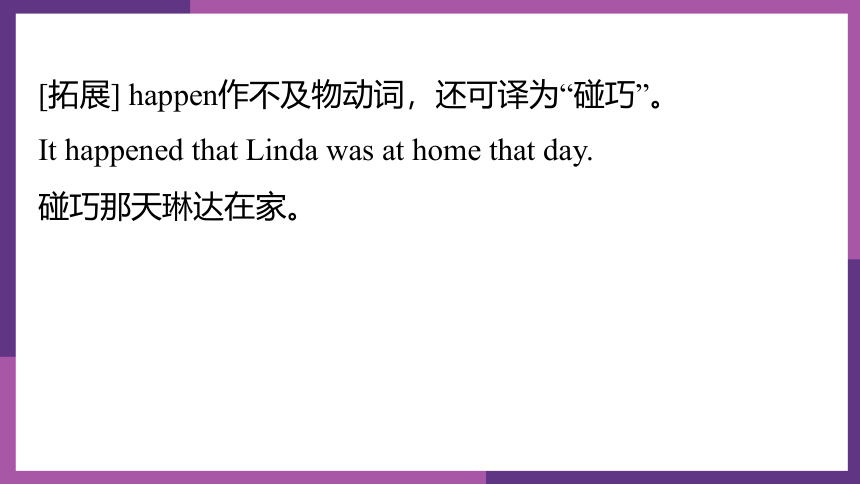Unit5 Amazing things period 3 Reading(19张PPT)
文档属性
| 名称 | Unit5 Amazing things period 3 Reading(19张PPT) |  | |
| 格式 | zip | ||
| 文件大小 | 99.7KB | ||
| 资源类型 | 教案 | ||
| 版本资源 | 牛津译林版 | ||
| 科目 | 英语 | ||
| 更新时间 | 2022-05-13 22:20:26 | ||
图片预览







文档简介
(共19张PPT)
Unit5 Amazing things
Reading(2)
Revision
Fill in the blanks
Last Sunday, Millie went to Sunshine Park with Amy. ___ _____, they often sit under the big tree. Suddenly, they heard a _______ from the ______. They looked around but saw _______. They were _____ and ___ ___ _____ quickly. They met _____ on their way and told him _________. At last, Andy found a ___ ___ in the ______. It was very _____.
As usual
whisper
nothing
afraid
bushes
left the park
Andy
everything
little cat
bushes
weak
He went to find Amy and Millie. They were _________to see the cat.
Later that day, they took the cat to the ______ ______.
What an unforgettable day!
surprised
animal centre
Language points
1. As usual, they sat down under a big tree.
像往常一样,她们坐在一棵大树下面。
He gets up at six as usual. 像往常一样,他六点钟起床。
[探究] as usual意为“照例;像往常一样”,相当于一个副词,在句中作状语。
[拓展] usual作形容词,意为“通常的,平常的”,其反义词为unusual。usual的副词形式是usually,意为“通常地”。
[探究] happen作不及物动词,意为“发生”。其常用于下列结构:sth. happens+时间/地点;sth. happens to sb.。
2. “What happened ” Andy asked.
“发生什么事了 ”安迪问道。
An accident happened in that street.
那条街上发生了一起事故。
[拓展] happen作不及物动词,还可译为“碰巧”。
It happened that Linda was at home that day.
碰巧那天琳达在家。
[探究] wonder作“琢磨,想知道”讲时,后常接what, who, why等引导的宾语从句;wonder作“感到诧异”讲时,后常接介词at或about。
3. “What is it ” Andy wondered.
“那是什么?”安迪想知道。
I wonder why Ann is late. 我想知道安为什么迟到了。
I wonder about his behaviour. 我对他的行为感到诧异。
[拓展] wonder还可作名词,意为“奇迹,奇观;惊奇”。
The children looked at the robot in wonder. 孩子们惊奇地看着机器人。
[探究] (1)turn around意为“转身;(使)翻转”。
(2)nothing=not…anything, 类似的词:
nobody=not…anybody。
4. They turned around but saw nothing.
她们转过身去,但是什么也没看见。
[拓展] turn的相关短语:
turn on 打开(电器、水龙头、开关等)
turn off 关闭(电器等)
turn up 调高(音量等);出现
turn down 调低(音量等);拒绝
[探究] leave 作动词,意为“离开”,相当于go away,常用进行时表示将来发生的动作,其常见用法:
5. They left the park quickly.
她们迅速地离开了公园。
6. “Here it is,” Andy said to himself.
“在这儿,”安迪自言自语道。
[探究] (1)“Here it is.”是一个________句。该句将表示方位的状语提到主语之前,目的是突出和强调状语。
(2)say to oneself意为“自言自语”,himself是反身代词,意为“他自己”。
倒装
[拓展] 在here, there引导的倒装句中,当主语是名词时用完全倒装,但当主语是代词时,就要用部分倒装。
Here comes the postman! 邮递员来了!
Here we are. 我们到了。
7. Millie and Amy were very surprised—it was a little cat!
米莉和埃米非常惊讶——它是一只小猫!
[探究] surprised 作形容词,意为“吃惊的,惊讶的”,用来修饰_____,常见搭配如下:
(1)be surprised to do sth. 做某事感到惊讶
I was surprised to meet John in the library yesterday.
我很惊讶昨天在图书馆遇到了约翰。
人
(2)be surprised at 对……感到惊讶
I was surprised at what Jim said. 我对吉姆说的话感到惊讶。
(3)be surprised+that从句 惊讶……
I was surprised that his cousin was a blind man.
我很惊讶,他的堂兄是个盲人。
[拓展] (1)surprise 作动词,意为“使惊奇;使诧异”。
His progress surprised me. 他的进步使我感到惊讶。
(2)surprise 作名词,意为“惊奇;惊讶”。to one's surprise意为“令某人惊讶的是”;in surprise意为“惊奇地;惊讶地”。
To my surprise, Helen lost her way in the supermarket.
令我惊讶的是,海伦在超市迷路了。
He looked up in surprise. 他惊讶地抬起头。
(3)surprising 作形容词,意为“令人惊讶的”,用来修饰________。
What surprising news! 多么令人惊讶的消息啊!
物
课堂练习
as usual, on her way, replied, turned around, left, to my surprise
用方框里的内容填空,有一个是多余的
1.Alice heard someone calling her name. She ________________ and saw her mother.
2.Mr Brown ________________ to me after I wrote to him about my problems the day before yesterday.
3. ________________, Millie was late for school. She was never late before.
turned around
replied
To my surprise
14. ________________ home, she met a homeless cat.
15. ________________, my father goes to the park to exercise on Sunday morning.
On her way
As usual
GOOD JOB
Unit5 Amazing things
Reading(2)
Revision
Fill in the blanks
Last Sunday, Millie went to Sunshine Park with Amy. ___ _____, they often sit under the big tree. Suddenly, they heard a _______ from the ______. They looked around but saw _______. They were _____ and ___ ___ _____ quickly. They met _____ on their way and told him _________. At last, Andy found a ___ ___ in the ______. It was very _____.
As usual
whisper
nothing
afraid
bushes
left the park
Andy
everything
little cat
bushes
weak
He went to find Amy and Millie. They were _________to see the cat.
Later that day, they took the cat to the ______ ______.
What an unforgettable day!
surprised
animal centre
Language points
1. As usual, they sat down under a big tree.
像往常一样,她们坐在一棵大树下面。
He gets up at six as usual. 像往常一样,他六点钟起床。
[探究] as usual意为“照例;像往常一样”,相当于一个副词,在句中作状语。
[拓展] usual作形容词,意为“通常的,平常的”,其反义词为unusual。usual的副词形式是usually,意为“通常地”。
[探究] happen作不及物动词,意为“发生”。其常用于下列结构:sth. happens+时间/地点;sth. happens to sb.。
2. “What happened ” Andy asked.
“发生什么事了 ”安迪问道。
An accident happened in that street.
那条街上发生了一起事故。
[拓展] happen作不及物动词,还可译为“碰巧”。
It happened that Linda was at home that day.
碰巧那天琳达在家。
[探究] wonder作“琢磨,想知道”讲时,后常接what, who, why等引导的宾语从句;wonder作“感到诧异”讲时,后常接介词at或about。
3. “What is it ” Andy wondered.
“那是什么?”安迪想知道。
I wonder why Ann is late. 我想知道安为什么迟到了。
I wonder about his behaviour. 我对他的行为感到诧异。
[拓展] wonder还可作名词,意为“奇迹,奇观;惊奇”。
The children looked at the robot in wonder. 孩子们惊奇地看着机器人。
[探究] (1)turn around意为“转身;(使)翻转”。
(2)nothing=not…anything, 类似的词:
nobody=not…anybody。
4. They turned around but saw nothing.
她们转过身去,但是什么也没看见。
[拓展] turn的相关短语:
turn on 打开(电器、水龙头、开关等)
turn off 关闭(电器等)
turn up 调高(音量等);出现
turn down 调低(音量等);拒绝
[探究] leave 作动词,意为“离开”,相当于go away,常用进行时表示将来发生的动作,其常见用法:
5. They left the park quickly.
她们迅速地离开了公园。
6. “Here it is,” Andy said to himself.
“在这儿,”安迪自言自语道。
[探究] (1)“Here it is.”是一个________句。该句将表示方位的状语提到主语之前,目的是突出和强调状语。
(2)say to oneself意为“自言自语”,himself是反身代词,意为“他自己”。
倒装
[拓展] 在here, there引导的倒装句中,当主语是名词时用完全倒装,但当主语是代词时,就要用部分倒装。
Here comes the postman! 邮递员来了!
Here we are. 我们到了。
7. Millie and Amy were very surprised—it was a little cat!
米莉和埃米非常惊讶——它是一只小猫!
[探究] surprised 作形容词,意为“吃惊的,惊讶的”,用来修饰_____,常见搭配如下:
(1)be surprised to do sth. 做某事感到惊讶
I was surprised to meet John in the library yesterday.
我很惊讶昨天在图书馆遇到了约翰。
人
(2)be surprised at 对……感到惊讶
I was surprised at what Jim said. 我对吉姆说的话感到惊讶。
(3)be surprised+that从句 惊讶……
I was surprised that his cousin was a blind man.
我很惊讶,他的堂兄是个盲人。
[拓展] (1)surprise 作动词,意为“使惊奇;使诧异”。
His progress surprised me. 他的进步使我感到惊讶。
(2)surprise 作名词,意为“惊奇;惊讶”。to one's surprise意为“令某人惊讶的是”;in surprise意为“惊奇地;惊讶地”。
To my surprise, Helen lost her way in the supermarket.
令我惊讶的是,海伦在超市迷路了。
He looked up in surprise. 他惊讶地抬起头。
(3)surprising 作形容词,意为“令人惊讶的”,用来修饰________。
What surprising news! 多么令人惊讶的消息啊!
物
课堂练习
as usual, on her way, replied, turned around, left, to my surprise
用方框里的内容填空,有一个是多余的
1.Alice heard someone calling her name. She ________________ and saw her mother.
2.Mr Brown ________________ to me after I wrote to him about my problems the day before yesterday.
3. ________________, Millie was late for school. She was never late before.
turned around
replied
To my surprise
14. ________________ home, she met a homeless cat.
15. ________________, my father goes to the park to exercise on Sunday morning.
On her way
As usual
GOOD JOB
